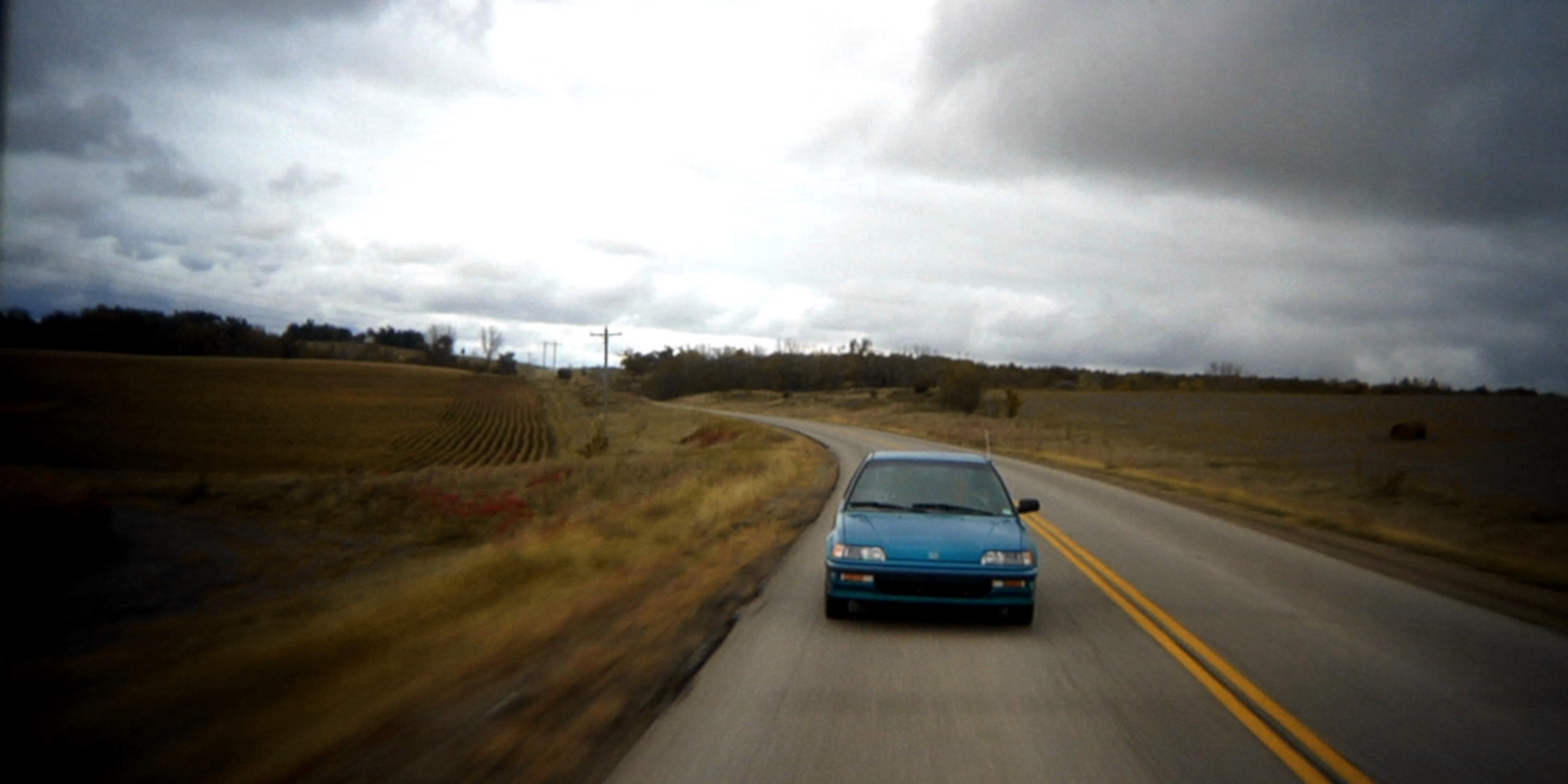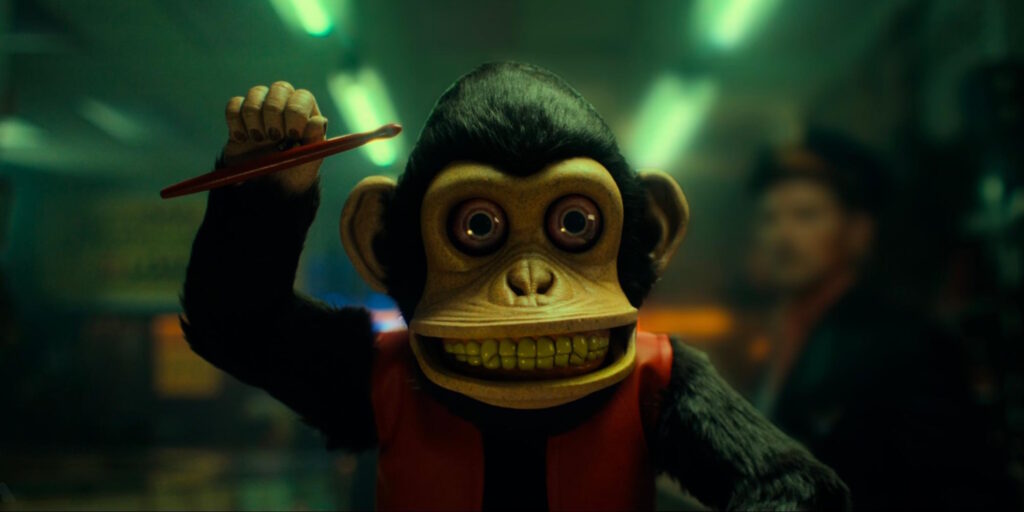[This retrospective essay on the features of independent Missouri filmmaker Blake Eckard was originally written in 2018. Additional minor edits have been made for clarity and style. The essay contains spoilers and is included as liner notes in Synapse Films’ new double-feature DVD of two of Eckard’s films, Bubba Moon Face (2011) and Coyotes Kill for Fun (2017). Full disclosure: Eckard and I have been friendly for several years and I am privileged to spread awareness of his distinctive and excellent body of work.]
Since 2001, independent filmmaker Blake Eckard has been ushering small groups of fortunate viewers through an astonishingly inimitable reality, one born out of observation, experience, and dark inspiration. Outwardly, this world resembles the director’s native northwestern Missouri, but its backroads meander through the Plutonic reaches of the cinematic underworld, snaking through half-acres of gothic gloom, film noir nihilism, and exploitation sleaze. To any filmgoer who has traversed the spiderweb of potholed blacktop and rutted gravel that stretches across the rural Heartland, it’s an uncannily familiar reality, as though the Show-Me State had been knocked slightly off its foundation and begun to slide inexorably into Purgatory.
Eckard is a forceful but slippery artistic voice, perpetually muddling the distinctions between the no-bullshit native guide, impassioned raconteur, and cool anthropological observer. It is so customary for independent American filmmakers to heedlessly fumble depictions of small-town Heartland life that it can be genuinely startling to encounter an auteur who approaches such settings without a whiff of condescension or glamorization. In the Trump Era, the concerns of “Real America” – i.e., rural, working-class whites of conservative bent – are an evergreen source of chin-stroking think pieces among the pundit class, but their observations are typically superficial, their analysis vacuous, and their conclusions self-serving. Eckard’s work is like a vaccine against this sort of gauzy op-ed flimflammery: the black bile of Middle America’s rot drawn out and repurposed into searing artistic truth through the medium of narrative cinema. By means of familiar dramatic components – anger, lust, greed, and good old-fashioned foolishness – he explores how common human experiences are informed by the scabrous particulars of place.
Eckard’s work is finely attuned to the raw, quaking disgruntlement of poor rural whites, particularly young men in their dust-caked Carhartts and camouflage ball caps – their discontent nurtured over crappy beer served in crappy bars in crappy towns. The filmmaker doesn’t excuse or approve of his characters’ often small-minded and pessimistic attitude, but he understands their mindset as only a native can, conveying it with the hard-edged elegance of muscle memory. There are no wistful laments for a vanished Rockwellian simplicity in his work, nor is there tsk-tsking urbane disdain for the backwards ways of rural folk. Eckard Country has no patience for outward-facing didacticism, instead privileging the gesture, the texture, and the moment. His cinema is political – as all art is – but only incidentally. It is foremost a cinema of passions, some naked and some inscrutable, but all poisoned by the weariness of Sisyphean, go-nowhere small-town life.
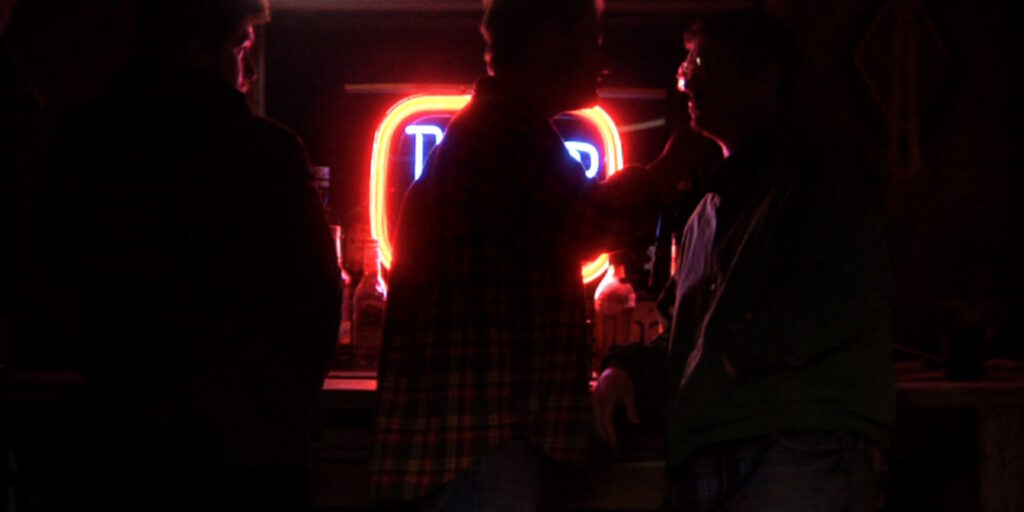
The title of Eckard’s first feature, A Simple Midwest Story (2001), is one of double meanings, inaugurating the distinctive mixture of plain-spoken frankness and acerbic irony that often characterizes the filmmaker’s work. This tale of bloodshed and animal terror is indeed simple, in the sense that it involves but four characters of import – perhaps five or six if one includes the perpetrators’ victims – and a mere handful of forlorn backcountry locations. Moreover, the emotions that rumble within the story are as primeval as Cain and Abel: wrath, jealousy, panic, and especially resentment, the clotted toxin of the soul that so often pulses through Eckard’s films.
Moment-to-moment, however, little about A Simple Midwest Story feels straightforward. Like the tales of criminal fiasco crafted by Joel and Ethan Coen – whose work Eckard’s filmography faintly echoes, albeit without the Brothers’ tart humor – the film centers on a single illicit act that zig-zags into a small-bore disaster. Nothing goes according to plan, because there is no plan, as de facto ringleader John (Alec Jennings) pointedly bellows to his terrified, simple-minded brother Dale (David Blair). As they and their conflicted cousin Bill (Nathan Marticke) scramble to cover up a brutal crime, the story assumes a sickeningly volatile quality, as though the viewer were watching a slow-motion car accident.
That second descriptor in the title, Midwest, is likewise two-faced, neatly embodying the half-light peculiarity of Eckard Country, positioned as it is between the grubbily specific and the dreadfully mythic. On the one hand, the feature – like all the filmmaker’s work – is deeply embedded in a fictionalized, thoroughly de-romanticized version of northwest Missouri, a place of chewed-up plains and seething souls. While this milieu is what makes Eckard’s films so distinctive in the largely homogenous landscape of micro-indie cinema, his stories never resemble exotic relics from some forgotten culture. A Simple Midwest Story could take place anywhere, rooted as it is in humanity’s essential viciousness and a Steinbeck-like air of anguished entropy. Straightway, Eckard’s first feature establishes the prevailing mode of his work: timeless and almost parable-like in essence, yet uncommonly vivid and authentic in its particulars.
John and Dale’s violent, loathsome stepfather Bud (Doug Bruster) is a tiresomely belligerent piece of work, a shiftless villain who has evidently inflicted years of casual abuse on his adolescent step-children. When Bud’s head is bashed in with a crowbar early in the film, in an act that is partly impulsive self-defense and partly cold-plated vengeance, one is not inclined to shed a tear. However, John quickly escalates the severity of the boys’ predicament by killing a potential witness and kidnapping another, the latter being Bill’s girlfriend Lisa (Kristy Berry).
A wily bully swollen with directionless anger, John confuses overbearing hostility for self-assurance – much like the stepfather he so despises, ironically enough – and he intimidates Dale and Bill into an ill-conceived cover-up. To call the ensuing succession of careening mishaps and half-assed efforts a “scheme” is too generous. This is the sort of yarn that requires no upright law-enforcement foil, given that the criminals are their own worst enemies. However, A Simple Midwest Story is no satisfying tale of karmic comeuppance. The viewer derives no pleasure from watching one righteously wrathful act of violence snowball into a blood-spattered debacle that ruins several lives. This is a story of evil begetting evil, of hatred, cowardice, and stone-cold stupidity coalescing into a perfectly wretched storm.
Like many debut features shot on a miniscule budget, A Simple Midwestern Story exhibits the sort of DIY ungainliness that inclines well-disposed critics to grade on a generous curve, and the less charitable ones to dismiss such works entirely. (In his favor, Eckard was, rather remarkably, a mere high school senior when the film was shot, as were other members of the cast and crew.) Admittedly, the performances veer into the ridiculously histrionic at times. In particular, Bruster’s turn as Bud leans into a high-strung, wearying cartoonishness; in subsequent works, Eckard would quickly flatten this sort of scenery-chewing in favor of a more magnetic, roiling viciousness in his villains. Some of the story beats don’t make a hell of a lot of sense, but even when his characters act in a confounding manner, the filmmaker occasionally finds ways to twist this absurdity into a memorable moment. (A favorite: While John and Dale lug a bound Lisa along like a sack of potatoes, she dryly greets her boyfriend with, “Hi, Bill,” passive-aggressively jabbing at his unaccountable willingness to go along with her abduction.)
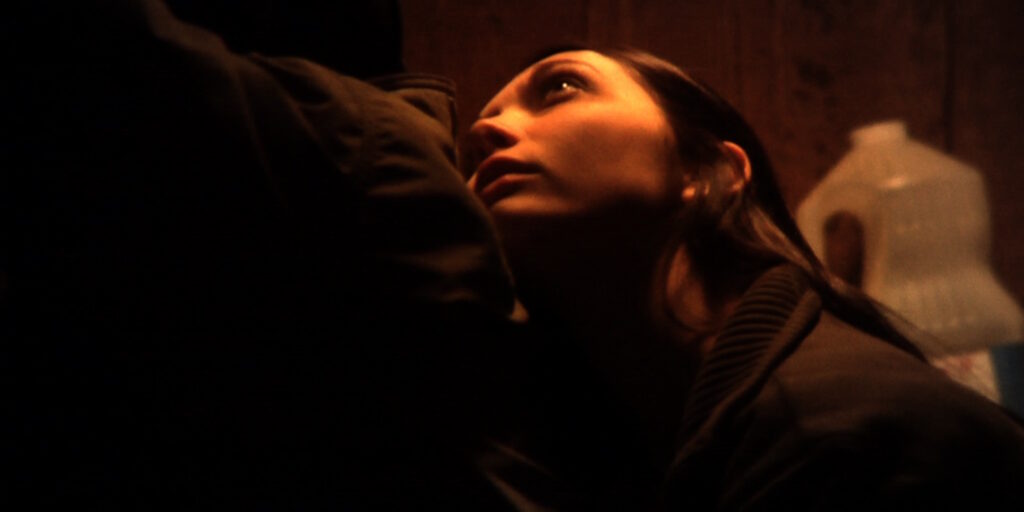
If A Simple Midwest Story evinces all the seams of a raw, first-time filmmaker feeling his way through a backyard production, it also demonstrates that Eckard’s forbidding, slightly distorted vision of life in his corner of rural America arrived fully-formed. That same vision is front-and-center in the director’s sophomore feature Backroad Blues (2006), but here it is wedded to sharper craft, more confident storytelling, and a deeper sensitivity to character. The grainy black-and-white of Eckard’s previous film is swapped for slightly blasted-out color, befitting a story that – while similarly bleak – feels unruly, eccentric, and faintly comical in a manner that suggests a rambling, hyperbolic anecdote.
Certainly, Backroads’ dimpled, motor-mouthed protagonist Chip (perennial Eckard player Tyler Messner) leaves an immediate but bewildering impression, to an extent not matched by any other major character in the director’s filmography. Chip is neither a hero, anti-hero, nor villain – he’s more of a disruptive force, blowing into people’s lives and cheerily reducing everything in sight to shambles before moving on. His latest victim is Kent (Alec Jennings), a laconic Missouri farm laborer with a wife and young daughter back home in the state’s bootheel. Penniless and apparently homeless, the recently paroled Chip fast-talks his way into a temporary gig at the same farm, and almost instantly begins screwing things up for Kent.
Chip is an insufferable but fascinating character: part chattering shoulder-devil, part grinning redneck schlemiel, part willfully malicious Iago (sans self-awareness). He’s the sort of creep who hectors a recovering alcoholic into having a beer by relentless repeating “c’mon, man,” until said teetotaler complies just to shut him up. Backroad Blues is essentially the story of how Chip nonchalantly grinds Kent’s life into dust simply by being his intolerable self. It’s not so much a tragedy as it is a grotesque spectacle, with the only salient question being how long Kent will tolerate his companion’s aw-shucks sociopathy before cutting and running. (Spoiler: Way, way too long.)
The cunning of Eckard’s characterization here is easy to overlook: He pummels the viewer with Chip’s unbearable mannerisms from the film’s first scene, but only reveals the depths of the man’s inner malignance incrementally. The first time he casually violates Kent’s trust – eagerly revealing a perilous secret at the first opportunity – the viewer begins to discern that Chip’s gregarious, good-ol’-boy demeanor masks a strange indifference to suffering. By the film’s conclusion, it’s apparent that Chip’s petty selfishness is symptomatic of a chilling moral blankness, one that would see him happily put a bullet in a friend’s head for $300 – without exhibiting even a speck of remorse.
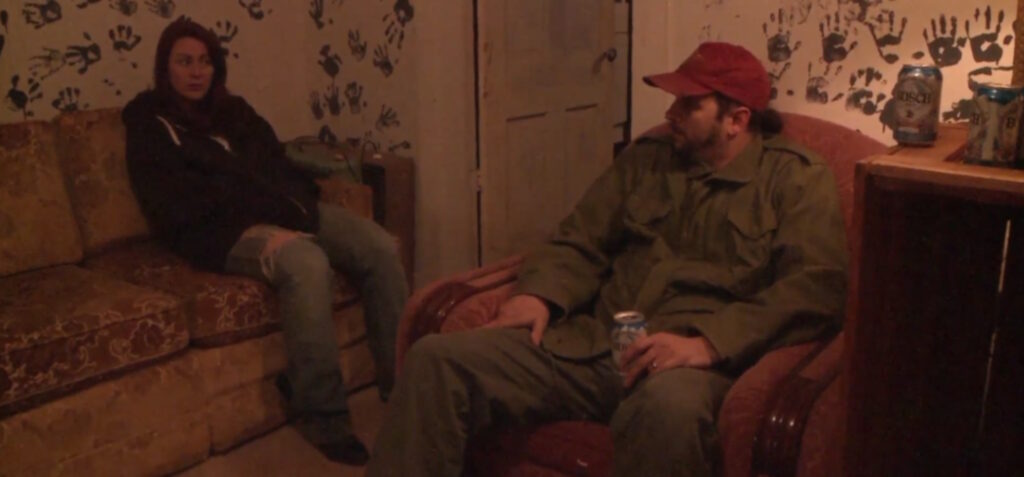
dBackroad Blues makes for a singular, emotionally punishing delve into the uglier recesses of human frailty and malevolence. Intentionally or not, Eckard’s next film, Sinner Come Home (2007) functions as something of a palate-cleanser, although it is no less concerned with that same fallibility. The closest the director has ever come to both pure melodrama and an outright tongue-clucking morality tale, Sinner concerns one Eddie Farnim (Ryan Harper Gray), a small-town countertop carpenter who is defined by his burgeoning sense of self-pitying discontent. Neither as hot-headed nor as lizard-cunning as some of Eckard’s other protagonists, Eddie is blessed with a doting wife, Jan (Christiana Hansen). She is a churchgoing homemaker who earnestly organizes her routine around Eddie’s happiness – and the family she’s eager to start with him. On some level, Eddie seems to appreciate that he struck gold with Jan, but he’s nonetheless beginning to chafe under her stifling, ceaseless devotion.
Sinner is the tale of Eddie’s sordid moral and spiritual unraveling, as a cascade of irritations, temptations, and humiliations prod him into making increasingly piss-poor choices. Yet the tribulations that befall him are fundamentally rooted not in forces beyond his control, but in his own failings – secret, small-minded dissatisfactions roiling just beneath the surface. A months-later epilogue aside, the film’s events take place over the course of roughly a week, and what’s impressive about Eckard’s storytelling here is how credibly he renders Eddie’s swift Jekyll-and-Hyde mutation from an easy-going working stiff into a snarling, two-timing brute. The implication being, of course, that the monster was always there, ready to be unleashed by a few petty catalysts: Jan’s honest frustration over their difficulty conceiving, the high-handed condescension of Eddie’s boss (Brent Jennings), the vamping of the boss’ sharp-tongued wife (Jennifer George), and one too many nights pounding cheap brews with voluble buddy Jim (Tyler Messner) at the local roadhouse.
While Eddie is the clear narrative focus of the film – and Gray’s simmering performance the acting standout – it’s Jan who ultimately garners the lion’s share of the viewer’s sympathy. Her needs and wants are simple, even retrograde, but Eckard refrains from portraying her as a dupe. Her love for Eddie is genuine, as is her Christian faith. (Despite the rural Midwestern setting, her religiosity seems to have more in common with the anguished pleading and questioning of the Catholic saints than it does with the fire-and-brimstone of a tent revival.) Her hopefulness, selflessness, and general aura of Madonna-like virtue serve to highlight how thoughtless and downright vile Eddie’s behavior is becoming. It’s not until a left-field swerve in the third act, however, that Jan begins to resemble a victim-cum-prop, when a minor subplot literally barges in and sexually assaults her. It’s the sort of cheap story turn often used to galvanize a male protagonist’s righteous wrath, but Eckard manages to (mostly) salvage the film from this dip into exploitative tastelessness, as Eddie ultimately decides to prioritize Jan’s well-being over patriarchal notions of honor and revenge.
Although stylistically similar to Eckard’s other work, Sinner Come Home feels like the most obvious outlier in the director’s filmography. Given the simple message it peddles — Appreciate your wife! Be decent to her! Don’t lie to her! – it feels more at home among the moralizing plays and films of Tyler Perry, of all writers, than with Eckard’s other features. Certainly, there’s a stripe of conservatism apparent in the film’s conclusion, which sees Eddie getting his life back on track: working a new job, laying off the booze, going to church on Sunday with a grateful Jan. As with all Eckard’s features, however, what impresses is the film’s sensitivity to the aimless, harrowed sensation that can attend the everyday male experience in the rural Heartland. Eckard never justifies the bubbling resentment that threatens to despoil everything good in Eddie’s life, but he elegantly explicates it through snippets of dialog and the evocative, lived-in grit of his shooting locations. (One can practically feel Eddie’s fidgety discontent oozing out of the cheap paneling walls of his and Jan’s little house.)
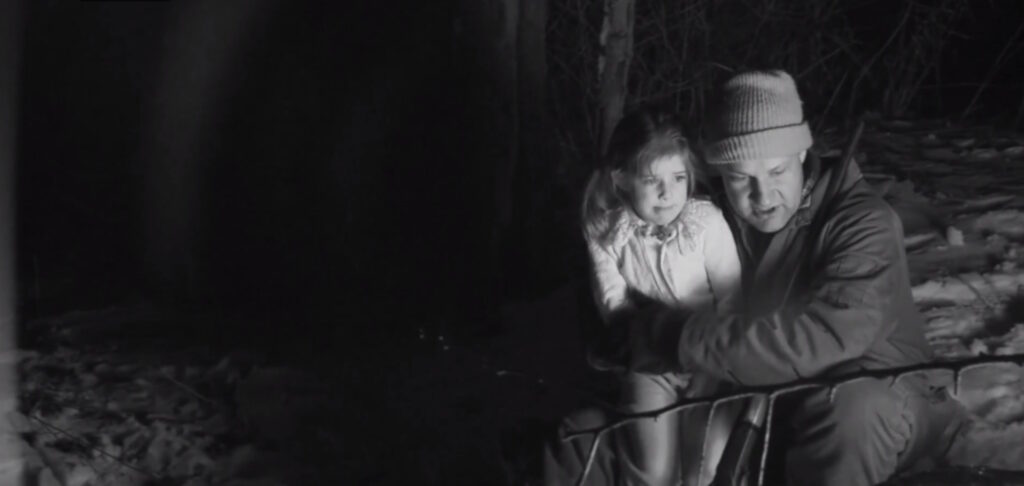
Notwithstanding the heightened hysterics of its garish quarrels and bathroom-floor sobbing, Sinner Come Home is grounded in familiar domestic concerns, such as kindness, fidelity, and attentiveness. Although centered on another troubled household, Bubba Moon Face (2011) is worlds apart from Sinner: a descent into grimy grotesquery and nightmarish disorder. We’re still in Eckard Country – those same muddy farmlands and churning brown streams around Stanberry, Missouri – but here the landscape is refracted through an infernal lens. On the occasion of his mother’s death, Horton Bucks (Tyler Messner) returns with some ambivalence to the town of his upbringing. Flat broke and burdened with a broken-down car, he crashes on the couch of his hound-raising, beer-swilling younger brother Stanton (Joe Hammerstone), ostensibly just for their mom’s funeral. Soon, however, the coyotes and buzzards are circling. Stanton’s erstwhile hookup Sabetha (Sylvian Geiger) appears, toting a newborn girl who she claims – in between cigarettes and torrents of profane invective – is his progeny. She’s shortly followed by the brothers’ shifty father, Gus (Joe Hanrahan), an aggressively disagreeable meth-addicted troglodyte who moves himself and his cow-eyed young girlfriend Tammy (Jennifer George) into Stanton’s only bedroom.
Horton, meanwhile, attempts to kindle a relationship (of sorts) with Leslie (Misty Ballew), a bruised and skinny thing who is now tending bar and turning tricks at the local watering hole – and was once the tweenaged target of Horton’s pedophilic attentions. It’s ugly and lurid as hell, but Bubba Moon Face is, if anything, more floridly gangrenous than these mere descriptions of redneck miserablism can convey. Eckard is at his most formally adventurous with this film, employing severe, amber lighting and impressionistic flourishes such as crude blurring and embossing effects. The result is sometimes clunky but often downright unsettling. It is further enhanced by the startling sound design, which emphasizes an oppressive ambient din that unavoidably recalls the wind-whipped firs of Twin Peaks and other Lynchian aural strangeness.
Eckard exhibits an atypical, almost horror-tinged willingness to indulge in jaw-dropping nastiness in Bubba, which arguably attains its grindhouse peak in a scene where the protagonist is sexually serviced while literally laying on top of a corpse. While Horton is a broadly contemptible and violent figure, his vague distaste for this festering corner of hell and all the awful people in it makes him the closest thing to an audience surrogate in the film. Whatever rumblings of conscience he possesses are encouraged by the presence of his infant maybe-niece, nicknamed Bubba. Her blamelessness and vulnerability – surrounded as she is by a household of fiends who neglect her while scheming how to profit off her – elicits Horton’s sympathy and further inflames his resentment about his own dysfunctional upbringing. It’s clear strictly from the film’s dire, suffocating atmosphere that Something Terrible is going to happen. Horton eventually succumbs to a kind of red-hazed resolve: If little Bubba makes it out of this appalling situation safely, that’s all that matters, and whatever blood sacrifices are necessary to achieve that will be gladly paid.
For all its miseries and horrors, Bubba Moon Face has a definite streak of black comedy. It’s arguably the drollest feature that Eckard has made to date, in its scuzzy, nauseating way. Messner is working in a completely different mode than his usual chatty, backslapping Eckard characters, portraying Horton as a cold-fish creep who squints in disapproval at everyone and everything, when he’s not lashing out in violent indignation. (It helps that the actor’s winning dimpled grin is obfuscated here by thoughtless facial hair and child-molester glasses.) Horton’s sour, reserved demeanor is often used to wry effect. When Stanton exclaims, “What’s that?!” after first laying eyes on Bubba, Messner pricelessly deadpans, “A puppy.” Elsewhere, Eckard coaxes some revoltingly charming bits of comic posturing from his players. When Horton discovers his long-vanished father improbably standing in Stanton’s house, Hanrahan spreads his hands as if to say, “Ta-da!,” in a gesture that feels both imperious and mocking.
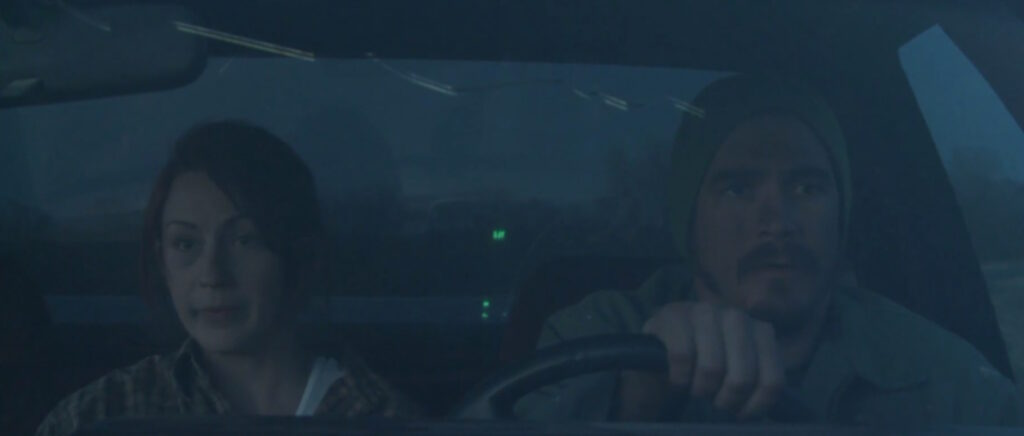
However, it’s the minute details that tether the warped netherworld of Bubba Moon Face to the northwest Missouri of our reality, whether it’s Stanton’s grumbling about “Oh-bam-a” taxes as he purchases a 30-pack of Busch Light, or the auto mechanic who rides a 4-wheeler ATV around town. This rigorous attention to the fine bumps and blisters of his native landscape is one of the defining features of Eckard’s work, and it arguably pays the most focused and searing dividends in Ghosts of Empire Prairie (2013). Splitting the difference between the pious melodrama of Sinner Come Home and the demonic sleaze of Bubba Moon Face, the director delivers a Biblical story of family and revenge that is deeply enmeshed in its precisely-drawn rural Midwestern milieu. The broad outlines of the tale are grimly universal – relocate the events to the Deep South or New England and they could unfold in a William Faulkner or Stephen King novel, respectively – but as a cinematic work, Ghosts is so entwined with Eckard’s signature regional sensibility that it feels intrinsically Show-Me in its bones.
More structurally ambitious and confident than any of the director’s prior works, Ghosts initially assumes an almost languid attitude towards its plot, mirroring the studied cowpoke nonchalance of protagonist Lonnie (Ryan Harper Gray). A former rodeo rider and self-proclaimed American nomad, Lonnie has returned home to the tiny town of Empire Prairie, allegedly “just passing through” on his way to better things. Initially, he seems more intent on bedding local women than dutiful reconnection, dropping in for a quasi-incestuous tryst with his ex-stepmother Lois (Jennifer George) and then picking up high school flame Dawn (Arianne Martin) at the roadhouse where she tends bar. Only then does he pay a courtesy visit to his alcoholic, cantankerous father Burl (indie filmmaking legend Jon Jost). Lonnie’s timid brother Ted (Frank Mosley) is still living in Empire, where he has assumed responsibility for their spiteful father, who is descending into dementia and blindness.
Eckard takes his time with Empire, allowing the viewer to simmer uncomfortably in Lonnie’s magnetism, impetuosity, and petty cruelty before revealing exactly why he’s returned home. Lonnie is a natural predator who uses his lanky height to aggressively sprawl and crowd the people around him. There’s an unsettling wolfish glimmer in the way he interacts with women, and a twisted mirth to his casual bullying of Ted. It’s not until roughly halfway through the film that the viewer witnesses Lonnie exhibit real fear and vulnerability. When one of his father’s drinking buddies wheedles him about his rodeo days – the slurring old-timer never actually glimpsed on-screen – Lonnie seems genuinely and unexpectedly spooked. In short order, Lonnie and Ted both confess to shameful secrets, and the elder brother reveals his still-amorphous plan for a violent retribution.
Empire’s mise-en-scène is more polished than that of Eckard’s other work, arguably due to the role that Jost played behind the camera as the film’s cinematographer. The storytelling feels impressively lean and focused in a way that its unhurried pace and superficially rough assembly rather cunningly obscure. Eckard favors long, sustained shots here, alternately highlighting a sense of forlorn exposure or claustrophobic menace – the latter evident, for example, when Lonnie leans in to seduce Lois with a kind of hostile (but not unwelcome) insistence. It’s the sophisticated yet understated characterization, however, that truly makes Ghosts of Empire Prairie stand out in Eckard’s filmography. Supported by solid performances and employing a mere handful of characters and settings, the director conveys an authentic sense of rotten family history: a hoarder’s stockpile of tears, blood, and unforgiveable sins, all of it disarrayed by the vagaries of memory and masculine codes.
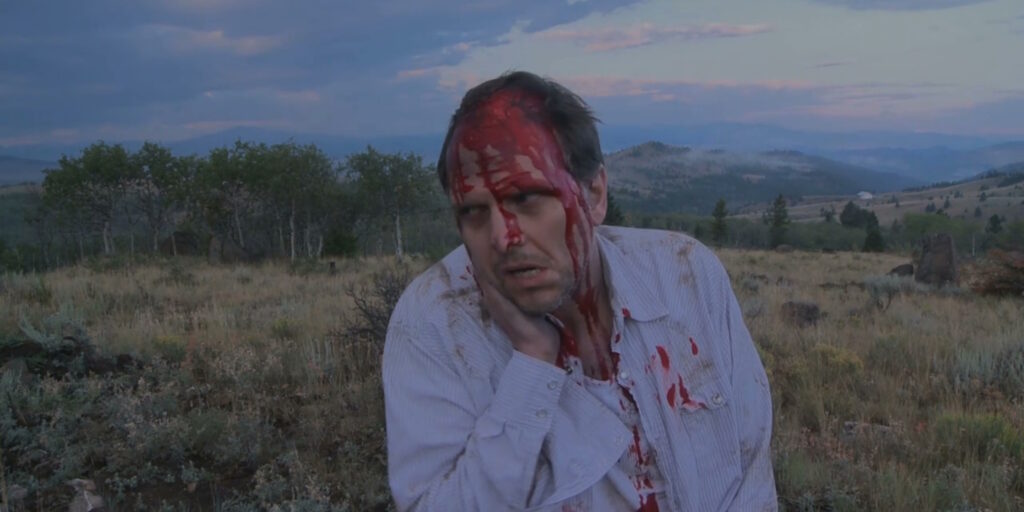
All of Eckard’s features contain a grain of neo-noir desolation, but the conventions of the genre are fully ripe in Coyotes Kill For Fun (2017). The story unspools like a jumbled, backwoods riff on The Postman Always Rings Twice, but with all the petty ambition scoured away. The femme fatale of this tale is auto mechanic Bev (Arianne Martin), who is shacked up with Larry (Todd Morten), the vicious maybe-daddy of her two children. Escape is Bev’s only aim, and to that end she consents to giving her co-worker Cliff (Tyler Messner) grubby sexual favors in return for his assistance in disappearing her live-in abuser. Also in on the scheme is the kids’ babysitter, Sue Anne (Roxanne Rogers), a former schoolteacher who dotes on Bev’s children and chitchats for long, rambling stretches with her dead brother, as though his spirit were a hovering presence.
Eckard quickly differentiates this wintery tale from comparable stories of seedy dealings and desperate misdeeds, in part by privileging Sue Anne’s viewpoint. As she wanders her draughty house and communes with her departed sibling Bill, the dead of generations past look on in mute judgment from fading photographs. The filmmaker also scrambles the story’s chronology, giving the bloody events the feeling of fragmented memory. Through these methods, Coyotes attains a dire, fatalistic sensibility, as though the film’s occurrences were tragic historical events, recalled in a series of rueful, confused anecdotes punctuated by bouts of sobbing.
The initially straightforward trajectory of Bev’s vengeful plot is complicated by the looming shadow of Larry’s diabolical brother Ed (Morten again). Recently released – or perhaps escaped – from prison in some distant state, Ed slouches towards the other characters with the single-minded resolve of a ravenous animal. In a series of superficially digressive scenes, the viewer observes Ed as he terrorizes former associates with his towering presence and faintly manic, mocking sadism. In the fashion of No County for Old Men‘s Anton Chigurh, Ed makes an instantly indelible impression, resembling a force of elemental evil as much as a traditional crime thriller villain. Also like Chigurh, he is the destabilizing factor in the plot, threatening to upend a plan that already seemed destined to become a bloody debacle. (Bev, foreshadowing just how-pear-shaped the situation will become, dryly observes at one point that she’s screwed up her life at every turn.)
Coyotes is Eckard’s darkest feature to date, a delve into an anti-karmic universe where righteousness is a laughable illusion and pain is rewarded with yet more pain. Near the film’s defiantly bleak conclusion, a mud-spattered Sue Anne, having survived Ed’s attentions and clawed her way back to her house, slumps into an armchair and ruminates on her failures. The sense of exhausted defeat embodied in this moment permeates Coyotes, save in those places where it is supplanted with outright appalled horror. The possibility that Bev’s children will fall into Ed’s murderous hands seems unthinkable at first, but the little handprints that inexplicably cover the walls of Bev and Larry’s remote house – echoing the demonic cabin in The Blair Witch Project – signal that innocence is not a protective shield in this dreadful world.
“Where is it?!,” Ed demands irately of every person unfortunate enough to cross his path. He refuses to explain his meaning, allowing the question’s vagueness to linger as though it were a threat. Like the titular outlaw’s agitated, endlessly repeated query in The Assassination of Jesse James by the Coward Robert Ford (“Where’s Jim Cummins?!”), the question is never clarified or answered, becoming rhetorical. “It” is, by default, one of the elements that seem to be missing from this world: decency, justice, sanity, or God Himself. Where is it? Not in Eckard Country. Not in the pressboard roadhouses or weedy fields of scrap iron. Not in the peeling farmhouses or the backs of rusted pickup trucks. (The latter are full of empties.) Not in the gas stations or the failing storefronts or the silty creeks with their polluted sheen. Not in the hearts of the people, certainly. Not in this mistreated and neglected corner of America, which only Blake Eckard seems to remember and cherish.
“Intensely Independent: The Micro-Budget Films of Blake Eckard” – which includes Bubba Moon Face (2011) and Coyotes Kill for Fun (2017) – is now available from Synpase Films.
